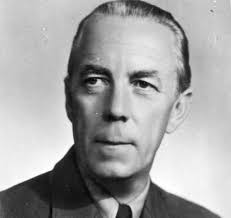Bernadotte’s Career: He Worked Hard at Making Peace, Associated Press, San Francisco Chronicle, Sep. 18, 1948.
 Click here to view the original article.
Click here to view the original article.
By Associated Press
Count Folke Bernadotte worked at making peace just as hard as other men worked at making war.
He was a leader in the International Red Cross and the United Nations’ official intermediary for peace in Palestine, where he forcefully invoked two tenuous truces.
Bernadotte asked as a go-between in Heinrich Himmler’s surrender negotiations for Germany in the closing weeks of World War II.
The count was a nephew of King Gustav of Sweden. He spent all his adult years as one of the genuine men of good will Europe has produced. Associates often said the key to his character was his “complete integrity.”
He was profoundly religious, but also gay and charming in manner.
As a Swedish Red Cross official he played a most active role in three wartime prisoner of war exchanges with Germany. He made many, some during the heaviest bombings of Berlin.
He was responsible for many morale measures during Sweden’s mobilization when war threatened. He headed the Swedish equivalent of the USO. He was also active in Boy Scout work, training boys as aircraft spotters and medical assistants.
He was head of the Swedish YMCA.
In private life, he was interested in publishing. He was chairman of the board of directors of Det Basta, the Swedish edition of Reader’s Digest.
During the New York World Fair just before the war, he was commissioner general of the Swedish pavilion. He also represented his country at the Chicago Century of Progress.
Bernadotte was more human than men of royal blood are supposed to be. Tall and lean, like most members of the Swedish royal family, he dressed with sober elegance. Impeccably outfitted, he frequently was seen riding his bicycle to work in Stockholm. Swedish friends said he just didn’t care for luxuries like limousines and chauffeurs.
Bernadotte was named to mediate the Palestine war last May. He was chosen for the job by the five big powers in the N. N. Security Council.
He soon flew to the Middle East and conferred with top leaders of both sides. His first cease-fire order took effect on June 8. Thereafter he made specific proposals to both sides to end the fighting, but his efforts were futile. The war was resumed at the expiration of the four country at the Chicago Century of Progress.
Bernadotte was ignore human than men of royal blood are supposed to be. Tall and lean, like most members of the Swedish royal family, he dressed with sober elegance. Impeccably outfitted, he frequently was seen riding his bicycle to work in Stockholm. Swedish friends said he just didn’t care for luxuries like limousines and chauffeurs.
Bernadotte was named to mediate the Palestine war last May. He was chosen for the job by the five big powers in the N. N. Security Council.
He soon flew to the Middle East and conferred with top leaders of both sides. His first cease-fire order took effect on June 8. Thereafter he made specific proposals to both sides to end the fighting, but his efforts were futile. The war was resumed at the expiration of the four weeks’ truce, even while he tried to arrange terms for a permanent peace.
His second truce order, backed by the authority of the 58-member United Nations, took effect July 18.
Bernadotte, who was Count of Wisborg, was born in Stockholm on January 2, 1895. He was of the sixth generation of the House of Bernadotte. His father was Prince Oscar Carl August, second son of King Oscar II and a brother of the present Swedish King. Prince Oscar renounced his rights to the throne when he married Ebba Henriette Munck, a lady of noble but non-royal blood.
Folke Bernadotte was the second son and the youngest of their five children. After early education, he entered the Officers’ Military School of Karlsberg, the Swedish West Point. He graduated 10th in his class and became a good enough horseman to collect several trophies.
In 1828 he married Estelle Romaine Manville, the daughter of H. Edward Manville, the American asbestos magnate. They met on the French Riviera and after a whirlwind romance of two weeks, became betrothed.
“You’ve got to work fast to get the best girl in the United States,” the count quipped.
It was said that King Gustav first met Miss Manville and introduced her to Count Folke.
Four sons were born to the couple. Two died in childhood. It is possible that this personal tragedy helped to influence the motto Count Folke coined himself-
“We do not live to be happy ourselves, but to make others happy.”



